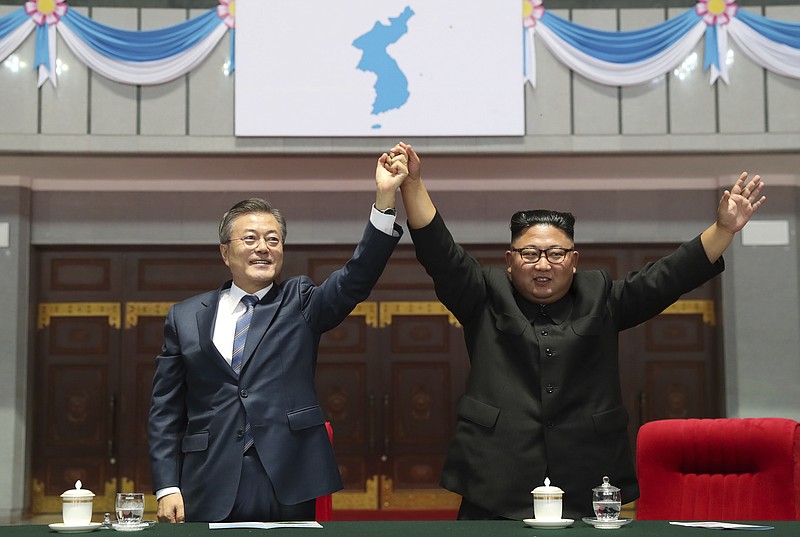WASHINGTON (AP) — A better-than-expected outcome of the summit between the two Koreas immediately kick-started stalled negotiations between Washington and Pyongyang, boosting President Donald Trump’s high-stakes push to get the North to give up its nuclear weapons by the end of his first term in office.
But it left open a burning question: Will the concessions North Korean leader Kim Jong Un is offering be enough to convince the U.S. to meet any of his demands?
Trump, characteristically, hailed the result of the talks in Pyongyang between Kim and South Korean President Moon Jae-in as “very exciting” and a sign of “tremendous progress” in his effort to get North Korea to denuclearize, which Kim agreed to do in vague terms when he met with Trump himself in Singapore in June.
Diplomacy between the U.S. and North Korea that had gotten nowhere since the summit clicked into gear again. Secretary of State Mike Pompeo on Wednesday invited North Korean Foreign Minister Ri Yong Ho for talks in New York next week, during the annual gathering of world leaders at the United Nations. North Korean representatives were also invited to meet with the U.S. envoy for North Korean policy, Stephen Biegun, in Vienna “at the earliest opportunity.”
“This will mark the beginning of negotiations to transform U.S.-DPRK relations through the process of rapid denuclearization of North Korea, to be completed by January 2021, as committed by Chairman Kim, and to construct a lasting and stable peace regime on the Korean Peninsula,” Pompeo said in a statement, using the initials of the country’s official name, the Democratic People’s Republic of Korea.
With scant progress in the past three months, Trump has been open to criticism that he had been too eager to hold an unprecedented meeting with the North Korean leader in the summer and gained little in return. Moon, who was the handmaiden of the Kim-Trump dialogue back in the spring, was under considerable pressure this week to extract concessions from Kim that could sustain the rapprochement between Washington and Pyongyang.
While Kim didn’t commit Wednesday to giving up his arsenal of nuclear weapons and ballistic missiles that pose a threat to the U.S. mainland, he did promise to dismantle North Korea’s main rocket launch site in the presence of international experts, and offered to shutter its Nyongbyon nuclear site. That’s where the North has a plutonium reactor and a uranium enrichment facility that can produce fissile material for atomic bombs. Dismantling it wouldn’t reduce North Korea’s atomic stockpile, thought to be enough for between 40-60 bombs, but it could help cap it.
The catch is Kim wants the U.S. to take unspecified “corresponding steps” — a likely reference to North Korea’s desire for the U.S. to declare a formal end to the Korean War, in which fighting ended in 1953 without a peace treaty. The North is also vying for the U.S. to allow relief from sanctions that are hurting its struggling economy.
Washington will be reluctant to grant hasty concessions given North Korea’s poor record during a quarter-century of on-off nuclear negotiations in following through on its promises. Mindful of past failures, the Trump administration has been demanding denuclearization, or at least concrete progress toward that goal, before it grants rewards.
That’s become the principal bone of contention between the two sides. On the eve of the Moon-Kim summit, an editorial in a North Korean state newspaper, Rodong Sinmun, blamed the U.S. for their diplomatic deadlock. It said Washington was “stubbornly insisting” the North dismantle its nuclear weapons first, while failing to show its will for confidence-building measures, “including the declaration of the end of war, which it had already pledged.”
Trump himself, who is eager for results in his signature foreign policy, sounded open to considering reciprocal steps, telling reporters Wednesday: “We’ll see what he’s looking at.” Trump also declared, “we’re making tremendous progress” with North Korea, citing its halt in nuclear and missile testing since last November.
Kim agreed to allow outside experts to observe the dismantling of its Sohae launch site, where it has tested missile engines and blasted rockets into space. Pompeo welcomed that as a step agreed to by Trump and Kim in Singapore, and said it would be done in the presence of U.S. and international inspectors.
North Korea has long been reticent of such outside scrutiny. It expelled U.N. inspectors from its Nyongbyon nuclear site a decade ago when international aid-for-disarmament talks collapsed and hasn’t allowed them back in since. The U.S. is demanding their return to see all facilities at Nyongbyon dismantled.

